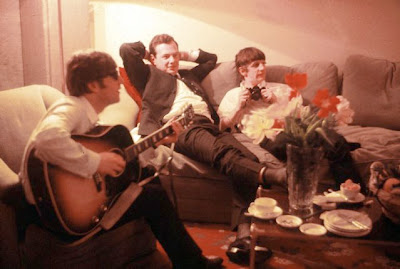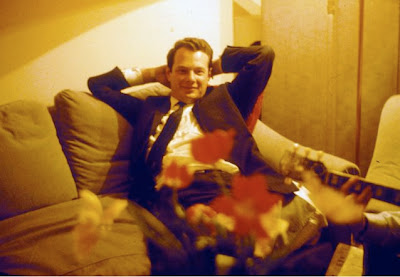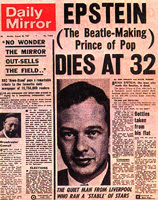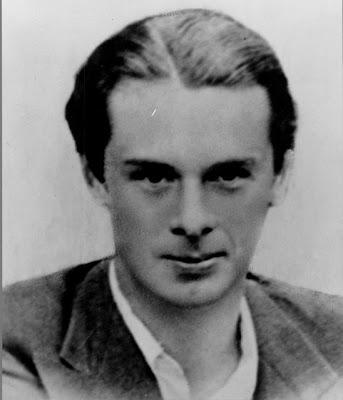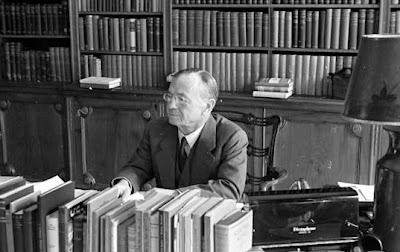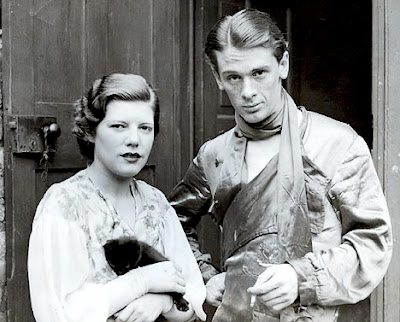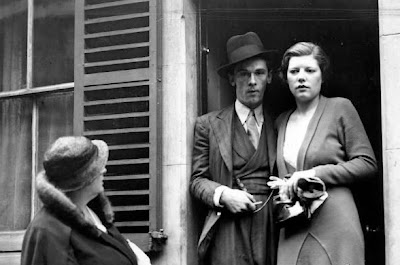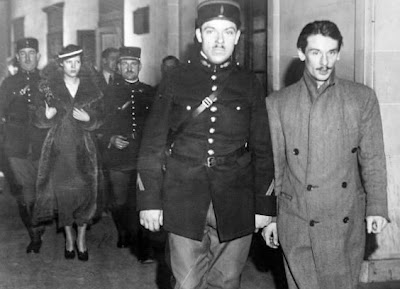 His light shows featured hand-assembled wet slides and Aldis projectors. His company called Five Acre Lights was actually named after a psychedelic nudist colony he ran with his wife at Five Acre Woods near Watford – which in reality, was a number of caravans in a sea of mud and a club house that featured a ‘trip machine’ and where Pink Floyd once played a gig on Guy Fawkes night in 1966. Braceland was a middle-aged, slightly weird beatnik character but for the relatively short while Happening 44 existed, it featured such bands as the Social Deviants and Soft Machine.
His light shows featured hand-assembled wet slides and Aldis projectors. His company called Five Acre Lights was actually named after a psychedelic nudist colony he ran with his wife at Five Acre Woods near Watford – which in reality, was a number of caravans in a sea of mud and a club house that featured a ‘trip machine’ and where Pink Floyd once played a gig on Guy Fawkes night in 1966. Braceland was a middle-aged, slightly weird beatnik character but for the relatively short while Happening 44 existed, it featured such bands as the Social Deviants and Soft Machine.‘Friday; Fairport Convention stays home tonight. Saturday; Fairport stays home again, patiently waiting for bookings’.
Alas Happening 44 closed down within a few months of opening and Jack Braceland went back to his Watford nudist colony, and presumably his ‘trip machine’, and was never really heard of again.
Soft Machine 1967
Fairport Convention in 1967/68
In his autobiography Owning Up Melly described the end of a typical rave: “At seven a.m. the band played its final number and we’d all crawl up out of the sweat-scented cellar into the empty streets of a Sunday morning in the West End. Hysterical with lack of sleep, accompanied by a plump art student, her pale cheeks smeared with the night’s mascara, I’d catch the Chelsea bus and try to read the Observer through prickling red eyeballs as we swayed along Piccadilly, down Sloane Street, and into the King’s Road. Then a bath, one of those delirious fucks that only happen on the edge of complete fatigue, and a long sleep until it was time to get up and face the journey to Cook’s Ferry or whatever jazz club we were playing that evening.”
and we’d all crawl up out of the sweat-scented cellar into the empty streets of a Sunday morning in the West End. Hysterical with lack of sleep, accompanied by a plump art student, her pale cheeks smeared with the night’s mascara, I’d catch the Chelsea bus and try to read the Observer through prickling red eyeballs as we swayed along Piccadilly, down Sloane Street, and into the King’s Road. Then a bath, one of those delirious fucks that only happen on the edge of complete fatigue, and a long sleep until it was time to get up and face the journey to Cook’s Ferry or whatever jazz club we were playing that evening.”
 but after the success of Lonnie Donnegan’s Rock Island Line it became the 44 Skiffle Club run by John Hasted – one of the earliest champions of skiffle which he saw as a form of teenage urban folk music. The house band was known as John Hasted’s Skiffle and Folksong Group and featured the young folk singer Shirley Collins. It’s easy today to be bemused about these clubs based around, as in George Melly’s case trad jazz and with Hasted skiffle and folk music, but these were the first youth movements based around music in this country. It wasn’t rock and roll that was the soundtrack for the first teenagers. Not in London anyway. Nor were they the first drug-takers in the capital.
but after the success of Lonnie Donnegan’s Rock Island Line it became the 44 Skiffle Club run by John Hasted – one of the earliest champions of skiffle which he saw as a form of teenage urban folk music. The house band was known as John Hasted’s Skiffle and Folksong Group and featured the young folk singer Shirley Collins. It’s easy today to be bemused about these clubs based around, as in George Melly’s case trad jazz and with Hasted skiffle and folk music, but these were the first youth movements based around music in this country. It wasn’t rock and roll that was the soundtrack for the first teenagers. Not in London anyway. Nor were they the first drug-takers in the capital.The 43 Club – Useful For Early Breakfasts

 The most notorious cocaine dealer in London during the 1920s was a man known as ‘Brilliant Chang’ – his name is still used as slang for cocaine to this day.
The most notorious cocaine dealer in London during the 1920s was a man known as ‘Brilliant Chang’ – his name is still used as slang for cocaine to this day.
In 1918 a popular young actress called Billie Carleton was found dead in her bed by her maid after attending the Victory ball at the Albert Hall. At her bedside was a gold box containing cocaine given to her by her boyfriend , the costume designer Reggie de Veuille. He had bought the drug from a Scottish woman called Ada and her Chinese husband Lau Ping You. Ada and de Veuille (the prosecution attempted to paint the worst possible picture and described him as ‘somewhat in foreign appearance and accent with an effeminate face and mincing little smile…’) were sentenced to five and eight months hard labour respectively but Lau Ping You escaped with just a £10 fine. The involvement of a Chinese man, however, whipped the press into a frenzy and the newspaper Pictorial News ran a series of pieces on the East End’s ‘Yellow Peril’. Very soon another Chinese man called ‘Brilliant’ Chang was brought to the forefront. Chang was a former Limehouse marine contractor but now ran a restaurant called ‘Shanghai’ in the same part of the East End. Limehouse was London’s original Chinatown but although the population reached its peak just after the First World War the population was probably only around 300 people.
a gold box containing cocaine given to her by her boyfriend , the costume designer Reggie de Veuille. He had bought the drug from a Scottish woman called Ada and her Chinese husband Lau Ping You. Ada and de Veuille (the prosecution attempted to paint the worst possible picture and described him as ‘somewhat in foreign appearance and accent with an effeminate face and mincing little smile…’) were sentenced to five and eight months hard labour respectively but Lau Ping You escaped with just a £10 fine. The involvement of a Chinese man, however, whipped the press into a frenzy and the newspaper Pictorial News ran a series of pieces on the East End’s ‘Yellow Peril’. Very soon another Chinese man called ‘Brilliant’ Chang was brought to the forefront. Chang was a former Limehouse marine contractor but now ran a restaurant called ‘Shanghai’ in the same part of the East End. Limehouse was London’s original Chinatown but although the population reached its peak just after the First World War the population was probably only around 300 people.
The Pictorial News said that Chang ‘dispensed Chinese delicacies and the drugs and vices of the Orient.’ The paper continued that Chang ‘demanded payment for his drugs in kind’ and further  enlightened its readers advising that women ‘who retained sufficent decency and pride of race’ turn down ‘this fellow with lips thin and cruel tightly drawn across even yellow teeth’. This description of Chang seems to have come directly from a Sax Rohmer Fu Manchu novel – literature that didn’t exactly help the Chinese immigrant community’s cause and stoked Londoners fears of drugs, foriegners and crime – “Imagine a person, tall, lean and feline, high-shouldered, with a brow like Shakespeare and a face like Satan, a close-shaven skull, and long, magnetic eyes of the true cat-green. Invest him with all the cruel cunning of an entire Eastern race, accumulated in one giant intellect, with all the resources of science past and present, with all the resources, if you will, of a wealthy government—which, however, already has denied all knowledge of his existence. Imagine that awful being, and you have a mental picture of Dr Fu-Manchu, the yellow peril incarnate in one man.”
enlightened its readers advising that women ‘who retained sufficent decency and pride of race’ turn down ‘this fellow with lips thin and cruel tightly drawn across even yellow teeth’. This description of Chang seems to have come directly from a Sax Rohmer Fu Manchu novel – literature that didn’t exactly help the Chinese immigrant community’s cause and stoked Londoners fears of drugs, foriegners and crime – “Imagine a person, tall, lean and feline, high-shouldered, with a brow like Shakespeare and a face like Satan, a close-shaven skull, and long, magnetic eyes of the true cat-green. Invest him with all the cruel cunning of an entire Eastern race, accumulated in one giant intellect, with all the resources of science past and present, with all the resources, if you will, of a wealthy government—which, however, already has denied all knowledge of his existence. Imagine that awful being, and you have a mental picture of Dr Fu-Manchu, the yellow peril incarnate in one man.”
According to the coroner there was no proof that he was linked to the death , but the police were convinced that he was. They raided his restaurant in 1924 and found a large quantity of the drug. He was jailed for 18 months and subsequently deported. The judge told him ‘It is you and men like you who are corrupting the womanhood of this country.’ While The Empire News wrote ‘Mothers would be well advised to keep their daughters as far away as they can from Chinese laundries and other places where the yellow men congregate.’
The Daily Telegraph reported a few years later that Chang had gone ‘blind and ended his days, not in luxury and rich silks, but as a sightless worker in a little kitchen garden.’
In the thirties, probably encouraged by the atmosphere of ‘yellow peril’ hysteria whipped up by the popular press, the local council decided to clear the ‘slum area’ around Limehouse and many of the Chinese shops, restaurants and gambling dens were swept away. This, and the extensive bombing of the area during the Second World War encouraged the gradual migration of Chinatown from the East End to the West End.
Kate Meyrick, meanwhile, after several spells in Holloway prison due to repeated licensing laws offences and the bribing of policemen, died in 1933 – dance bands in the West End, apparently, fell silent for two minutes in tribute.
















